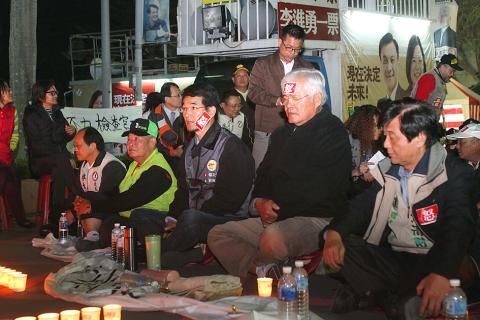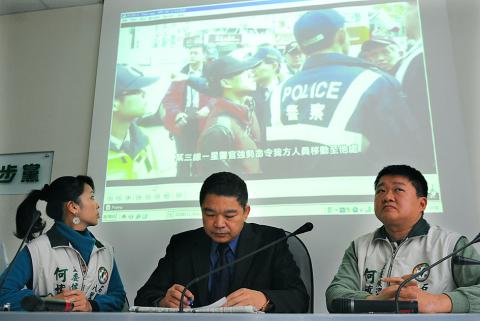The fairness of Saturday’s presidential and legislative elections is in question after nationwide reports of the improper handling of cases of suspected vote-buying by the police and judiciary, the Democratic Progressive Party (DPP) said yesterday.
Lee Chin-yung (李進勇), the DPP legislative candidate in Yunlin County’s first district, and Liu Chien-kuo (劉建國), the DPP legislative candidate in Yunlin’s second district, had been on a hunger strike since -Tuesday night in front of the Yunlin District Prosecutors’ Office to protest a raid on Lee’s campaign headquarters in Tuku Township (土庫) earlier that day, which the two claimed was an act of political repression.
Chiang Teh-lung (蔣得龍), chief of the Yunlin District Prosecutors’ Office, said his office had received reports that alleged Chen Wei-teh (陳威德), one of Lee’s campaigners, was involved in election betting prior to raid, adding that the investigation was legal even though the office found no evidence of wrongdoing and did not confiscate any documents.

Photo: Lin Kuo-hsien, Taipei Times
Lee and Liu, who decided to suspend their campaign activities, ended the hunger strike yesterday afternoon after a visit by DPP vice presidential candidate Su Jia-chyuan (蘇嘉全), who urged the two to carry on campaigning.
Yunlin County Commissioner Su Chi-fen (蘇治芬) voiced support for her party comrades, saying that the judiciary was turning a blind eye to prevalent vote-buying in the pan-blue camp to carry out selective enforcement against DPP politicians.
In Chiayi County, another hunger strike ended yesterday as Tsai Chi-fang (蔡啟芳), a former DPP legislator and father of a DPP legislative candidate in the county’s first district, Tsai Yi-yu (蔡易餘), was sent to a hospital at 11am for dehydration and dizziness.

Photo: Lin Kuo-hsien, Taipei Times
Tsai Chi-fang said the local judiciary and police were ignoring vote-buying allegations against the pan-blue camp and he began his hunger strike on Jan. 4 in front of the Chiayi District Prosecutors’ Office.
DPP spokesperson Kang Yu-cheng (康裕成) told a press conference in Taipei that the judiciary’s inaction in the face of widespread vote-buying allegations against the pan-blue camp was unjust.
DPP mayors and commissioners in six cities and counties — Greater Kaohsiung and Greater Tainan, as well as Chiayi, Yunlin, Pingtung and Yilan counties — have issued a joint statement urging fair and stringent investigations into vote-buying, Kang said.
Vote-buying in Greater Taichung, Changhua and Nantou counties has caused great concern, she added.
Commenting on the Yunlin case, DPP lawyer Lin Hung-wen (林鴻文) said the raid was highly questionable and appeared to be unnecessary because the prosecutors did not gather evidence.
Meanwhile, Ho Po-wen (何博文), the DPP legislative candidate for New Taipei City’s (新北市) first district, yesterday said local police used violence against his wife while she was campaigning at a local market in Linkou District (林口) on Tuesday morning.
Chiu Chin-an (邱槿桉), Ho’s wife, said police punched and pushed her, as well as her staffers, because they were campaigning in the same place as President Ma Ying-jeou (馬英九), who is seeking a second term.
In response, Tsai Yao-kun (蔡耀坤), director of the New Taipei City Police Department’s Sinjhuang Precinct, said members of Ho’s campaign were asked to keep a distance from the designated point of arrival of the presidential motorcade, which is standard procedure, adding that officers did not use violence.

CHAOS: Iranians took to the streets playing celebratory music after reports of Khamenei’s death on Saturday, while mourners also gathered in Tehran yesterday Iranian Supreme Leader Ayatollah Ali Khamenei was killed in a major attack on Iran launched by Israel and the US, throwing the future of the Islamic republic into doubt and raising the risk of regional instability. Iranian state television and the state-run IRNA news agency announced the 86-year-old’s death early yesterday. US President Donald Trump said it gave Iranians their “greatest chance” to “take back” their country. The announcements came after a joint US and Israeli aerial bombardment that targeted Iranian military and governmental sites. Trump said the “heavy and pinpoint bombing” would continue through the week or as long

TRUST: The KMT said it respected the US’ timing and considerations, and hoped it would continue to honor its commitments to helping Taiwan bolster its defenses and deterrence US President Donald Trump is delaying a multibillion-dollar arms sale to Taiwan to ensure his visit to Beijing is successful, a New York Times report said. The weapons sales package has stalled in the US Department of State, the report said, citing US officials it did not identify. The White House has told agencies not to push forward ahead of Trump’s meeting with Chinese President Xi Jinping (習近平), it said. The two last month held a phone call to discuss trade and geopolitical flashpoints ahead of the summit. Xi raised the Taiwan issue and urged the US to handle arms sales to

BIG SPENDERS: Foreign investors bought the most Taiwan equities since 2005, signaling confidence that an AI boom would continue to benefit chipmakers Taiwan Semiconductor Manufacturing Co’s (TSMC, 台積電) market capitalization swelled to US$2 trillion for the first time following a 4.25 percent rally in its American depositary receipts (ADR) overnight, putting the world’s biggest contract chipmaker sixth on the list of the world’s biggest companies by market capitalization, just behind Amazon.com Inc. The site CompaniesMarketcap.com ranked TSMC ahead of Saudi Aramco and Meta Platforms Inc. The Taiwanese company’s ADRs on Tuesday surged to US$385.75 on the New York Stock Exchange, as strong demand for artificial intelligence (AI) applications led to chip supply constraints and boost revenue growth to record-breaking levels. Each TSMC ADR represents

State-run CPC Corp, Taiwan (CPC, 台灣中油) yesterday said that it had confirmed on Saturday night with its liquefied natural gas (LNG) and crude oil suppliers that shipments are proceeding as scheduled and that domestic supplies remain unaffected. The CPC yesterday announced the gasoline and diesel prices will rise by NT$0.2 and NT$0.4 per liter, respectively, starting Monday, citing Middle East tensions and blizzards in the eastern United States. CPC also iterated it has been reducing the proportion of crude oil imports from the Middle East and diversifying its supply sources in the past few years in response to geopolitical risks, expanding